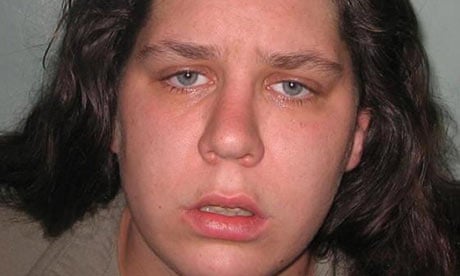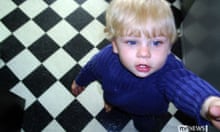In the life and times of Tracey Connelly there are few redeeming facts.
An absent father who was a sex offender, a neglectful mother , and another relative who was lured into a paedophile ring in one of the biggest children's home scandals of the late 20th century. As an adult Connelly made the very worst out of this unpromising start, standing by while her own son Peter was subjected to months of abuse that eventually ended his life.
Today, as she serves her sentence in the segregation unit of a British prison, Connelly is said to be fully aware of the contempt in which she is held. "She has no doubt that when she is named the anger and hatred will be even greater," said a source.
It is easy to vilify Connelly. Described as selfish, calculating and manipulative by the trial judge, she once told on an internet networking site how instead of nurturing her baby son, she spent her days drinking vodka, watching pornographic films and having sex with her new boyfriend Steven Barker, a man who had an IQ of 60 and was himself the product of an abusive background.
When she mentioned Peter, it was to express delight in having a little boy, saying he was the coolest person and adding that the best thing to happen to her was "becoming a mum".
It is this gulf between her expressed maternal delight and her inability to perform even the most basic motherly tasks for her son, let alone protect him from the torture and abuse meted out to him in her home, which is perhaps the most confusing part of the case.
Peter died just over two years ago on 3 August 2007 in a bloodstained cot in the upstairs bedroom of a dilapidated semi-detached council house in Tottenham. He had lived in a private hell for months at the hands of Barker and his brother, Jason Owen. When Peter died there were more than 22 injuries on his body, a fingernail and toenail were missing, having been ripped out in some form of torture, his earlobe was torn and his spine had been fractured by being hyperextended over his cot or someone's knee.
When Peter was found lifeless in his cot, it was Barker and Owen – both of whom were eventually convicted of causing or allowing his death – who were first into the room. Connelly was lying in bed, as was her usual practice, late into the morning, after nights drinking and logging on to the internet to share secrets such as "I was drinking cocktails and large vodka and cokes. I got really drunk like a t***" with her unknown audience.
She said afterwards: "I could tell he was dead. I felt I had failed him and not got him help earlier. I didn't know what was wrong with him.
"I thought it was medical and I had failed."
Connelly had been deliberately blind to what was happening to her son, colluding in a cover-up with her lover and deceiving social services about who exactly was living in her home.
In the two weeks before Peter died her obsession with Barker was total. In one internet entry she said she was "madly in love with the most amazing guy" and "my fella is nuts". It was at this point that the final attacks on the toddler were taking place.
Inside Connelly's home evidence of the depravity in which she and her child lived was everywhere. There was faeces, both animal and human, on the floor, the dismembered corpse of a rabbit on the kitchen table, a flea infestation and a layer of filth on every surface. Put simply it was, Judge Stephen Kramer has said, a house permeated with a climate of abuse and neglect.
But wind back 28 years to Connelly's beginnings and the echoes of neglect, deprivation, cruelty and abuse are hard to ignore.
Connelly was born on 29 June 1981 in Leicester, the product of a liaison between a travelling salesman and Mary O'Connor, her Irish-born mother. She grew up with her brother, who was four years older, but before Connelly was two her mother had split up with the salesman and moved the family from Leicester to north London.
Like her daughter would go on to do, Connelly's mother neglected her children.
By that time her mother was living with another man, one whom Connelly would call her dad. But when she was 12 her mother revealed that he was not her real father after all. Connelly has spoken little about her background and has told legal sources that she does not want her life re-examined, but she has said that the information about her father "sent me a bit wild for a while".
"I went through a period of wanting to find him," she said. At this point relationships within the family were breaking down. Connelly claims she was being physically abused, and eventually because of the situation at home with her mother she was taken under the wing of Islington social services along with her relative.
She was given the choice of being placed into care in a children's home or a live-in reform school. She chose the latter. The relative, however, did enter a children's home run by Islington, at a time when unknown to the wider world they were in the grip of a paedophile ring targeting children unchecked by the authorities.
When the child abuse scandal that permeated Islington's homes was exposed in the 1990s the position of Connelly's relative was considered so serious that a separate report was written about him. Known as Child A, he was targeted by the paedophile ring as a victim and then groomed into becoming a kind of pied piper, luring other children from Islington homes into the grips of the group of abusers.
Meanwhile, Connelly was not unintelligent and was at school where she managed to pass a handful of GCSEs, including English and IT. She worked for a time in a hairdressers, but at 16, barely beyond childhood herself, she met Peter's father and married him at a ceremony in Haringey civic centre. He was 17 years older than her. When Peter was born she said she was delighted. "I was desperate for a boy, I was ecstatic when he was born," she said.
Expert sources who have examined Connelly say that she could exhibit love and playfulness towards a child. Anna Motz, a consultant clinical psychologist who has studied women who abuse or collude with a partner's abuse, said: "In cases like this there is often this early experience of abuse and trauma and neglect in the mother's background.
"What I see happening is that the mother can develop a narcissistic attitude or way of relating to their child as an extension of themselves and goes on to treat the child with the cruelty, contempt and neglect that they were exposed to themselves. Their norms are different from other people.
"I see a great number of cases like Baby Peter or potential Baby Peter cases. There is this mythology that these cases are rare, they are not. And because of the scale of this the dynamics of the maternal abuse, neglect or collusion in a partner's abuses should not be overlooked. It needs to be examined and addressed."
Connelly has said that her experience with social services as a girl made her "terrified of social workers". But the police believe her experiences within the care system also made her knowledgeable about ways to dupe the authorities.
When Barker moved into her home from the end of 2006 Connelly managed to keep this from the authorities. Barker was a victim of childhood abuse himself, he claimed in court. He said his brother, Owen, had abused him and another family member. Owen was dominant and in control, and Barker turned the abuse he suffered into sadistic attacks on others.
By the time he moved in, Peter was six months old and it was then that the most significant abuse began to appear. Connelly chose to ignore the signs, and instead immersed herself in satisfying her own needs.
She wrote on a social networking site in November 2006: "It's funny when you meet someone and fall in love. You spend as much time as poss kissing and touching and having sex. You want to make them feel so good you just can't get enough of each other. It's great."
At the same time Connelly's real father had reappeared and became a visitor to the house. But he too had an unsavoury past. He was convicted in the 1970s in Leicester for the rape of a 14-year-old girl, police sources have confirmed – something which should have been checked out by Haringey as he was visitor to the home of a child on their protection register.
Today Connelly still protests that she did not know what was going on within the four walls of her house, where Peter lived and died. Her lawyers say she has been wrongly damned for the actions of her boyfriend and his brother and treated more harshly than other mothers in similar cases of neglect and abuse.
But having studied the probation reports, which are said to be damning, and the psychiatric assessments of Connelly, Judge Stephen Kramer for one did not believe her claims of innocent naivety.
Connelly, he said, was "selfish, calculating and manipulative". Her insistence that she was unaware of what was going on in the house, and what suffering Peter was enduring at the hands of Barker and his abusive brother Owen, "defies belief".
Where the truth lies only Connelly knows. Motz believes that in cases like Connelly's it is worth the investigation and assessment of a mother's background if only to learn in future how to prevent further cases like Peter's.
The only insight into Connelly's view of herself came in notes written before Peter's death. One read: "Life is bullshit." Another went on: "I'm fed up with letting people down. All my life I have messed up. When will I ever get it right.
"Sometimes I wonder why I am here as I always feel I'm useless and worthless. People should stay away from me as I have always messed up everyone who's close to me. I'm a jinx to all I know."
Labelled a risk to young children and subject to an indeterminate sentence, Connelly may serve much longer than the minimum five-year term for allowing Peter's death. Like Myra Hindley she will face vitriol in and out of the prison system. It will only be if and when she is no longer judged a risk that Tracey Connelly will walk free to face the reaction of society.


